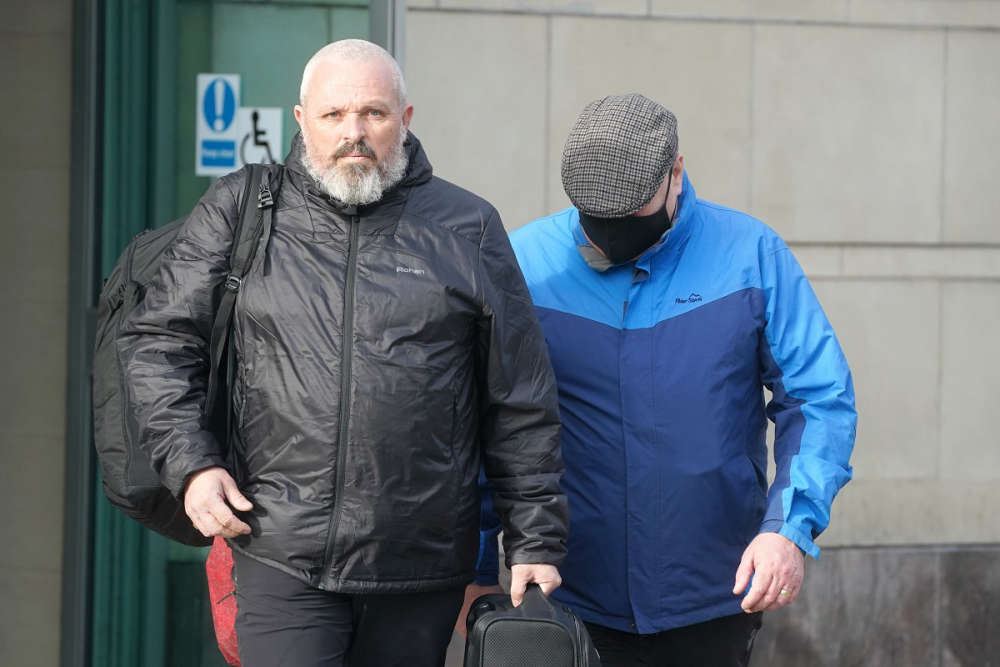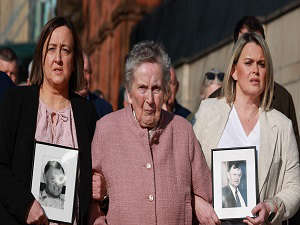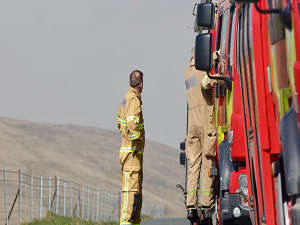
Jonathan McCambridge, Gráinne Ní Aodha and David Young (PA)
Imposing a custodial sentence on a former soldier found guilty of killing a man at an army checkpoint in Northern Ireland more than 30 years ago would be “unjust and unfair”, a court has heard.
In November, David Jonathan Holden, 53, was convicted of the manslaughter of Aidan McAnespie in February 1988.
He was the first veteran to be found guilty of a historical offence in Northern Ireland since the Good Friday Agreement.
Former Grenadier guardsman Holden, who was released on bail pending sentencing, returned to Belfast Crown Court on Friday for the sentence hearing.
His defence barrister made a plea for a suspended sentence in what he called a “unique” case, arguing that it would be “unjust and unfair” to impose an immediate custodial sentence.
Before hearing the pleas from both sides, the judge told the court that as “there are a number of issues that I have to consider”, he would not pass sentence on Friday.
The sentence will be given next Thursday.
Regardless of what sentence is handed down, the veteran is expected to serve only a maximum of two years in jail under the controversial early release provisions of the 1998 Good Friday peace agreement.
Mr McAnespie, 23, was killed in Aughnacloy, Co Tyrone, moments after walking through a border security checkpoint.
He was on his way to a local Gaelic Athletic Association club when he was shot in the back.
Holden had admitted firing the shot which killed Mr McAnespie but had said he had discharged the weapon by accident because his hands were wet.
But trial judge Mr Justice O’Hara said he was satisfied beyond reasonable doubt that Holden was guilty of manslaughter by gross negligence.
He found that Holden had pointed a machine gun at McAnespie and pulled the trigger, while assuming the gun was not cocked.
During the sentence hearing on Friday, defence barrister Frank O’Donoghue argued that it was “exceptional” for an 18-year-old to be charged and convicted of gross negligence manslaughter in this manner.
He told the court that military practice at the time was to place lethal weapons in remote areas of Northern Ireland which were manned by young, inexperienced soldiers.
“It is right to observe that just as Mr Holden has duties, as found by the court, towards members of the public, so too does the British Army.
“And the British Army has duties towards Mr Holden, and they grossly failed to discharge those duties with the consequences that have occurred.”
Mr Holden’s behaviour “belies a gross immaturity”, he argued, adding that it was accepted this is “a difficult sentencing exercise”.
“This man has led an otherwise unblemished life” and there is evidence of “genuine remorse,” he said.
The court was told that Mr Holden “had a breakdown on the firing range” following the incident and was discharged from the military in 1990.
“He has suffered and continues to suffer from the effects of PTSD,” the defence barrister said, making a plea to the court for a suspended sentence.
Prosecution counsel Ciaran Murphy said that while the events “relate to an event a long time ago, it is relevant to everyone in society”.
He also raised the “profound loss” suffered by the McAnespie family and the “enormous risk” taken by Holden when he was in no danger.
Speaking outside the court, the brother of Aidan McAnespie said they found proceedings on Friday difficult.
“On behalf of the McAnespie family, we found it very difficult there today that we were thinking all through the case that Aidan was the victim, but today it seems that Mr Holden was the victim,” Sean McAnespie said.
“The only remorse was for himself and what he went through. There was no word about Aidan over this last 35 years.”
The sentence hearing comes amid ongoing controversy over government plans to deal with Northern Ireland’s troubled past.
The Northern Ireland Troubles (Legacy and Reconciliation) Bill proposals provide an effective amnesty for those suspected of killings during the conflict, if they agree to co-operate with a new body, known as the Independent Commission for Reconciliation and Information Recovery (ICRIR).
The Bill would also prohibit future civil cases and inquests related to Troubles crimes.
Grainne Teggart, Amnesty International UK’s deputy director in Northern Ireland, said: “The significance of this case is clear both for the McAnespies and particularly at a time when the UK Government continues to push through the overwhelmingly opposed Troubles Bill which cruelly betrays the many victims still seeking justice while protecting the perpetrators of manslaughter, murder, torture and other serious crimes.”

Former Grenadier Guardsman David Holden ( In blue) leaves Laganside Courts, Belfast, following his sentencing hearing for the 1998 Troubles killing of Aidan McAnespie at an army checkpoint. Mr Holden, the first veteran to be convicted of a historical offence in Northern Ireland since the Good Friday Agreement (Photo by PA)


 O’Neill writes to PM urging public inquiry into Sean Brown murder
O’Neill writes to PM urging public inquiry into Sean Brown murder
 Campaign to increase cancer awareness through pharmacies rolled out
Campaign to increase cancer awareness through pharmacies rolled out
 Concern over PSNI vehicles fleet, with 20% off road at worst point in 2023
Concern over PSNI vehicles fleet, with 20% off road at worst point in 2023
 Man released by police after Newry stabbing incident
Man released by police after Newry stabbing incident
 Firefighters tackle almost 150 wildfires across three days in Northern Ireland
Firefighters tackle almost 150 wildfires across three days in Northern Ireland